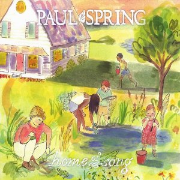As half of the country-punk (punk-country?) duo Key Wilde and Mr. Clarke, the Texas-bred Wilde has produced a couple great albums of often raucous music for families. So Brian Eno -- whom I'm most familiar with through his work with the Talking Heads and his album Music for Airports -- was not the first artist I expected Wilde to mention in my series featuring kindie musicians talking about albums that have influenced them as a musician.
But here he is, praising Eno for his 1974 album Here Come the Warm Jets , and he explains how that helped set him off on his musical path, and even draws a link between that nearly-40-year-old album and a track off his latest album, the excellent Pleased To Meet You .
*****
There have been many favorite records over the years I could list as influences but one in particular stands out and seems worth mentioning here: Here Come The Warm Jets – the first solo album by Brian Eno. I must have first discovered the record while working at a record store in Houston – my summer job following my sophomore year in college. Needless to say, the majority of my wages that summer went right back to the company store. My appreciation for diverse genres of music (and my record collection) expanded quite a bit in those two months.
The record had been out for a few years and was certainly not Eno’s latest release at the time. Of course, being an obsessive music aficionado, I knew who Eno was. He had been a founding member of Roxy Music – one of my favorite bands – but had left after the second album. And there were the collaborations with Bowie and Talking Heads. And he had produced the first Devo album – was talked about as the “go-to” producer who brought elements of chance and “Oblique Strategies” into the recording studio. So I thought of him as an eccentric, yet somewhat ascetic, technical wizard who tinkered with synthesizers and created ambient records like Music For Films and Music For Airports.
So to discover this quirky singer-songwriter with compelling, absurdist lyrics and catchy melodies mining the history of rock and roll completely knocked me out. The backing band, featuring everyone in Roxy Music except Bryan Ferry, sounded to me like the Velvet Underground – probably my favorite band at the time. And I immediately fell in love with Eno’s voice. There was something so English – the accent, the colloquialisms – that really appealed to me in contrast to all the British singers who tried to sound American. (This appreciation probably later led to my collaboration with Mr. Clarke.)












